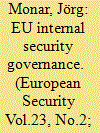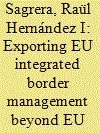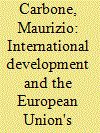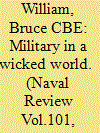|
|
|
Sort Order |
|
|
|
Items / Page
|
|
|
|
|
|
|
| Srl | Item |
| 1 |
ID:
128237


|
|
|
|
|
| Publication |
2014.
|
| Summary/Abstract |
There are clear indicators that in spite of the sensitivity of internal security in terms of essential state functions and national sovereignty an EU governance framework with specific characteristics has emerged in the counter-terrorism field. Common threat assessments guide governance responses, and specific institutional structures, cooperation mechanisms, legal instruments, and forms of external action have been put into place to respond to the cross-border nature of the terrorist challenges. However, in line with the general subsidiary role only of the EU as provider of internal security in addition to the Member States, this governance framework remains based on the interaction and cooperation between national counter-terrorist systems and capabilities that remain largely under national control and still enjoy relatively wide margins of discretion in terms of priorities, legal framework, and organization. This analysis concludes that the EU's internal security governance - as evident from the counter-terrorism field - may be best characterized as an advanced institutionalized system of cooperation and coordination between national governance frameworks constructed around a core of common instruments and procedures with a cross-border reach.
|
|
|
|
|
|
|
|
|
|
|
|
|
|
|
|
| 2 |
ID:
129583


|
|
|
|
|
| Publication |
2014.
|
| Summary/Abstract |
External action has been of growing importance for the Union's Area of Freedom, Security and Justice (AFSJ) and accounted in 2011 already for over 19 per cent of all texts adopted by the Justice and Home Affairs Council. AFSJ related external action has also added a new dimension to previously existing fields of EU external relations. This article first considers the internal and external factors which have influenced the development the external side of the AFSJ and the impact of the post-Lisbon legal and institutional framework, including the special context created by the 'opt-outs' and coherence problems within this framework. It then provides a survey and analysis of the main forms of EU action in this domain (strategy formulation, cooperation with third countries, capacity-building and cooperation with and within international organizations) before assessing-in the conclusions-the implications of this external dimension for both the EU and the Member States and its future developments prospects.
|
|
|
|
|
|
|
|
|
|
|
|
|
|
|
|
| 3 |
ID:
129584


|
|
|
|
|
| Publication |
2014.
|
| Summary/Abstract |
The external dimension of European Union (EU) border management cooperation has recently been developed, in particular through the promotion of integrated border management (IBM). The European Commission has been keen to foster IBM, an attempt to reach EU standards in the absence of an EU common border service. Integrated border management is regulated under the Treaty of Lisbon, and the Stockholm Programme calls for its further development. This article analyses and compares the policy instruments promoting IBM standards beyond EU borders, namely the European Agency for Operational Cooperation at the External Border of the Member States of the EU (FRONTEX) (with the signature of Working Arrangements with the border services of third countries) and the activity of the EU Border Assistance Mission to the Republic of Moldova and to Ukraine (EUBAM) at the Ukrainian-Moldovan border. Moreover, it provides an empirical account of IBM activity carried out in the Eastern Partnership and Russia, and explains the reasons underlying the lack of IBM promotion in the southern Mediterranean countries.
|
|
|
|
|
|
|
|
|
|
|
|
|
|
|
|
| 4 |
ID:
126625


|
|
|
|
|
| Publication |
2013.
|
| Summary/Abstract |
This special section explores and explains how the European Union's (EU's) overall approach to international development has evolved since the beginning of the twenty-first century. At the international level, the rise of a group of emerging economies has not only provided developing countries with greater choices, but has also further enhanced their agency, thus questioning the EU's leadership and even relevance in international development. At the European level, the various (paradigmatic) shifts in each of the three key external policies-trade, security and foreign policy-and the EU's aspiration to project a coherent external action have collided with the EU's commitment to international development. Numerous tensions characterize the various nexuses in EU external relations, which ultimately challenge the EU's international legitimacy and (self-proclaimed) identity as a champion of the interests of the developing world. Nevertheless, the EU has made more progress than is generally acknowledged in making its external policies more coherent with its development policy. Moreover, the EU's relationship with developing countries has gradually become less asymmetrical, though not because of the EU's emphasis on partnership and ownership but more because of the increased agency of developing countries.
|
|
|
|
|
|
|
|
|
|
|
|
|
|
|
|
| 5 |
ID:
128650


|
|
|
|
|
| Publication |
2013.
|
| Summary/Abstract |
All too frequently military interlocutors outside the European Union - EU get frustrated that we don't act or feel like NATO. What follows attempt to address that frustration and suggest that the unique complexities of the EU are both desirable and increasingly proving to be an advantage in some circumstance. The other highlights how the EU integrates military effects into its external action and shows why the EU does not duplicate NATO, why it has a different philosophy of working ; why (at times) it has entirely different roles; and why such difference may eventually be seen as more complementary, and not in competition, with the efforts of other defence dominated organisations such as NATO.
|
|
|
|
|
|
|
|
|
|
|
|
|
|
|
|
| 6 |
ID:
146095


|
|
|
|
|
| Summary/Abstract |
The development of a coherent EU Rule of Law external action strategy requires that the Union overcome two “diversity dilemmas” and one “consistency dilemma.” The three dilemmas are interrelated and ought to be approached holistically. The first diversity dilemma pertains to the great divergence in the current uses and understandings of the concept of the Rule of Law. The second emanates from empirical reality, rather than conceptual challenge. In the contemporary global system, the EU faces a broad, possibly widening, set of political regimes which pose distinctly different Rule of Law challenges. A meaningful Rule of Law external action strategy therefore cannot be based on uniformity of conceptualization or policy prescriptions but must contend squarely with a reality of great, and arguably growing, variance. Grappling with diversity while maintaining conceptual and policy coherence represents the third key challenge to the development of a coherent EU Rule of Law external action strategy. Resolving the consistency dilemma necessitates accommodating diversity within a coherent conceptual and policy framework. This, in turn, requires that, in its external action, the EU approach the Rule of Law as a central pillar of a broader, liberal political-development agenda and that it adopts a vertical (rather than the traditional horizontal) understanding of the concept, involving broadly progressive, cumulative, and hierarchical spheres of Rule of Law conditions.
|
|
|
|
|
|
|
|
|
|
|
|
|
|
|
|
|
|
|
|
|